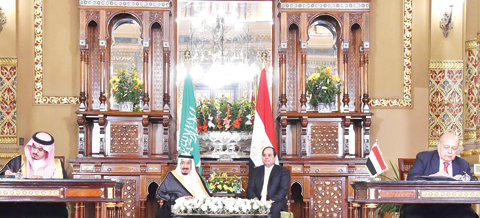 CAIRO: A handout picture released by the Egyptian Presidency on April 9, 2016 shows Egyptian President Abdel Fattah Al-Sisi (C-R) and Saudi King Salman bin Abdulaziz (C-L) attending a signing ceremony for bilateral agreements at the Abdeen Palace in the capital. — AFP
CAIRO: A handout picture released by the Egyptian Presidency on April 9, 2016 shows Egyptian President Abdel Fattah Al-Sisi (C-R) and Saudi King Salman bin Abdulaziz (C-L) attending a signing ceremony for bilateral agreements at the Abdeen Palace in the capital. — AFP
CAIRO: Saudi King Salman called yesterday for a joint fight against "terrorism" in the Middle East at a time when Riyadh is engaged in several conflicts the region. The 80-year-old monarch is on a rare five-day visit to Egypt, a trip seen as a clear show of support for Egyptian President Abdel Fattah Al-Sisi, the former military chief who toppled his Islamist predecessor Mohamed Morsi in 2013.
The two leaders have already signed a slew of multi-billion-dollar investment deals, and on Saturday Egypt agreed to demarcate its maritime borders with Saudi Arabia by officially placing two islands in the Straits of Tiran in Saudi territory. The Egyptian government says the two uninhabited islands - Tiran and Sanafir at the mouth of the Gulf of Aqaba - are Saudi but have been in Egypt's custody for protection since 1950.
Any agreement on the two islands must be ratified by the Egyptian parliament, a 596-seat chamber packed with Sisi supporters. However, news of the agreement has kicked off a storm on social media networks, with activists arguing that handing over the two islands to the Saudis was tantamount to a sell-off to the kingdom. Many of the critics cited an agreement reached between Egypt and the Ottoman Empire in 1906 that awarded sovereignty over the islands to Egypt. Others posted video clips of nationalist President Gamal Abdel-Nasser, who ruled Egypt in the 1950s and 1960s, asserting Egypt's ownership of Tiran.
Fighting Extremism
"The other mission that we should work on together is the fight against extremism and the fight against terrorism," King Salman said in an address to the Egyptian parliament broadcast live on state television. Egyptian lawmakers received Salman with deafening applause and a standing ovation. Some lawmakers waved the kingdom's green flag, while others chanted "all of Egypt greets you" or "welcome!"
After the speech, two lawmakers recited poems in praise of the monarch. The king later left the chamber, holding hands with the speaker, Ali Abdel-Al. That a Saudi king was invited to address the Egyptian parliament is evidence of how close relations are between the two nations, despite differences over policies on Syria and relations with Turkey and Qatar, two Saudi allies accused by Cairo of supporting militant Islamic groups.
In December, Saudi Arabia announced the creation of an "anti-terrorism" coalition whose members it said would share intelligence, counter violent ideology and deploy troops if necessary to combat extremists. The kingdom is part of the US-led coalition bombing the jihadist Islamic State group in Iraq and Syria. Riyadh is also leading an Arab coalition, of which Egypt is a member, that has been bombing Iran-backed Houthi Shiite rebels in Yemen.
Saudi Arabia has been a key backer of Sisi since the overthrow of Morsi, whose Muslim Brotherhood movement was viewed by Riyadh with suspicion. It has since pumped billions of dollars in aid and investment into Egypt. On Saturday, King Salman and Sisi agreed to set up a $16 billion investment fund, and also settled the long-standing maritime dispute. Salman announced on Friday a plan to build a bridge over the Red Sea to Egypt, and inked several other agreements Egypt hopes will boost its battered economy.
His visit follows months of reports in Saudi and Egyptian newspapers of strained ties over Cairo's unwillingness to participate fully in operations against Houthi rebels in Yemen. Egypt had announced it would back Saudi Arabia with ground troops if needed, but appears to have balked at the prospect of becoming mired in the conflict. For Saudi Arabia, which is in competition with regional rival Iran, keeping Egypt under its aegis is crucial, and it has played a key role in propping up Egypt's economy. - Agencies

